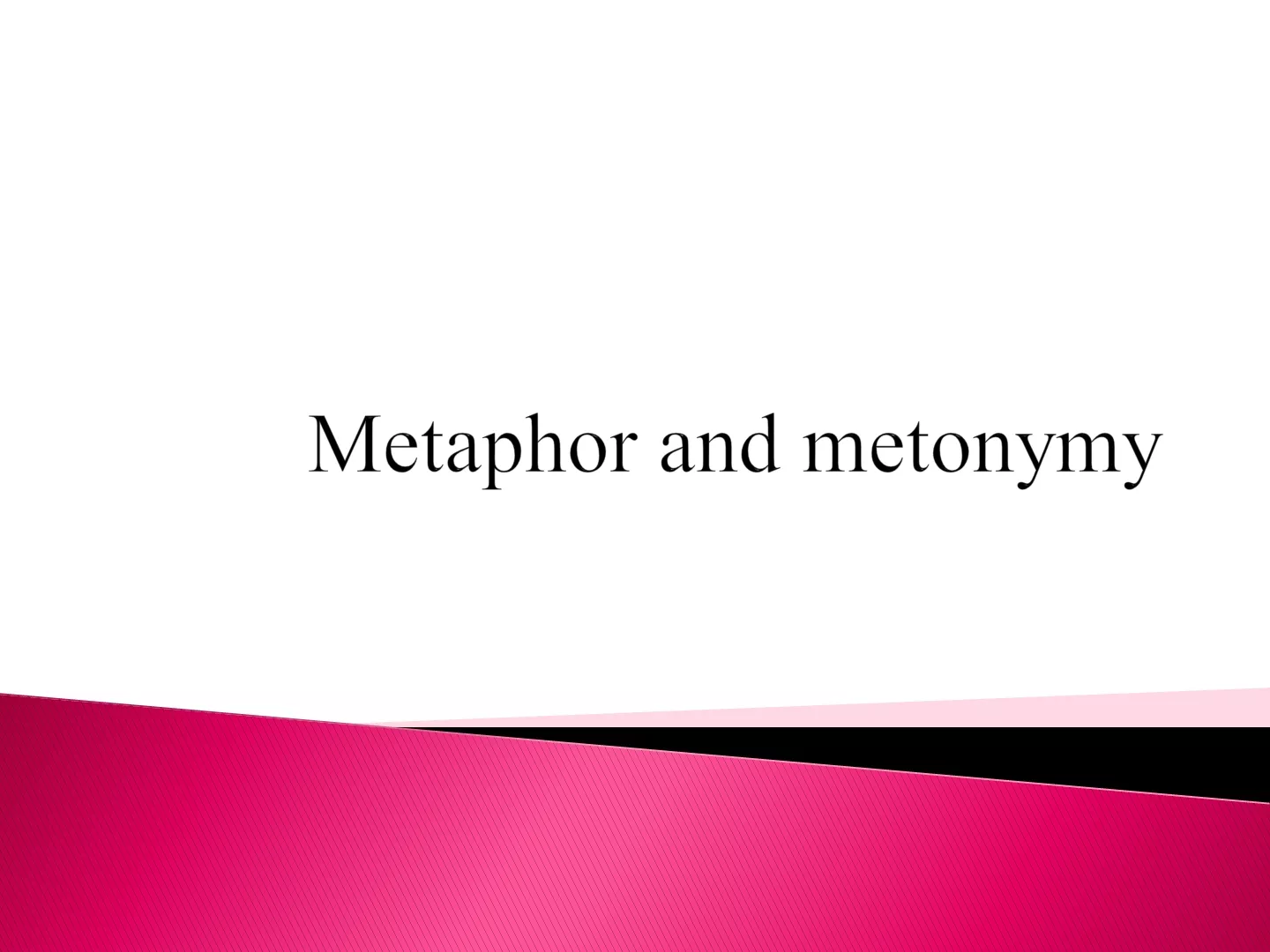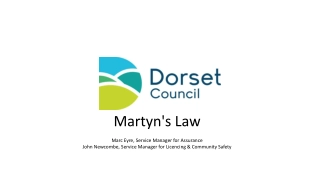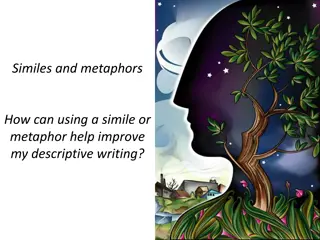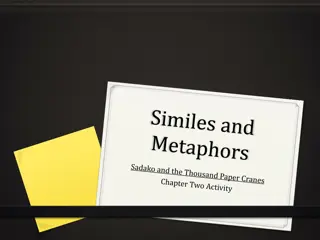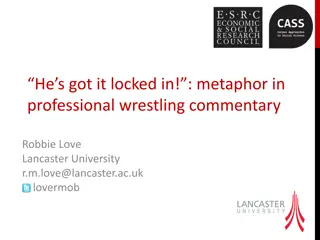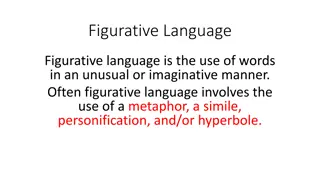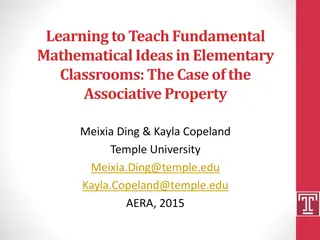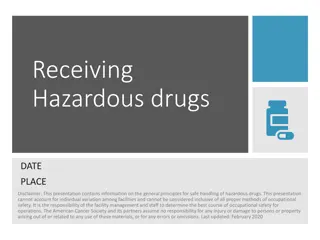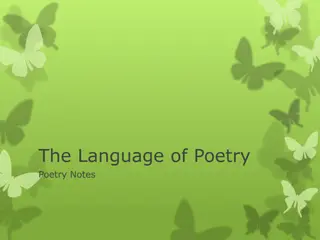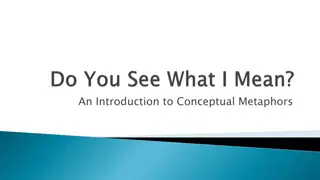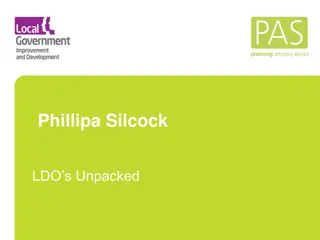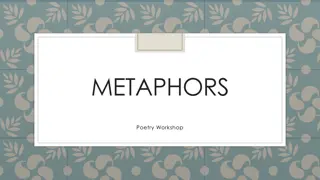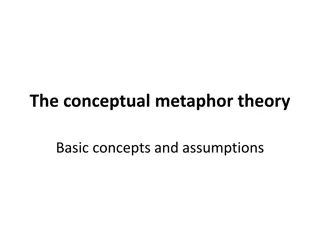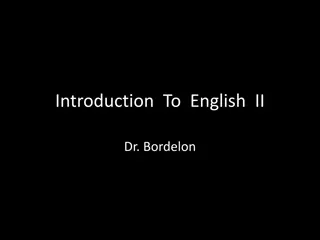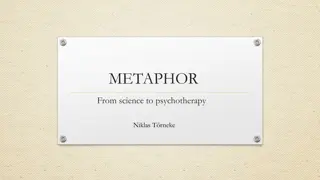Unpacking Metaphors in Research Journey by Martyn Hammersley
Research is likened to a journey using metaphors to navigate the complex process. Martyn Hammersley shares insights on the role of metaphors in data analysis and theoretical development. Understanding research as a personal journey that requires constant planning and adaptation, where clarity on goals and flexibility in approach are crucial for fruitful outcomes.
Download Presentation

Please find below an Image/Link to download the presentation.
The content on the website is provided AS IS for your information and personal use only. It may not be sold, licensed, or shared on other websites without obtaining consent from the author.If you encounter any issues during the download, it is possible that the publisher has removed the file from their server.
You are allowed to download the files provided on this website for personal or commercial use, subject to the condition that they are used lawfully. All files are the property of their respective owners.
The content on the website is provided AS IS for your information and personal use only. It may not be sold, licensed, or shared on other websites without obtaining consent from the author.
E N D
Presentation Transcript
Finding Your Way in Research Martyn Hammersley The Open University, UK These slides available at: http://martynhammersley.wordpress.com/ Keynote given at an on-line conference organised by the University of Exeter Graduate School of Education March 2021
Research as a journey. Metaphors as a means of making sense of the world (see Lakoff and Johnson Metaphors We Live By) The role of metaphors in the analysis of data and in developing theoretical ideas. I hope to illuminate some key aspects of the research process, but perhaps my talk will also illustrate a sort of thinking that can be productive in data analysis. Introduction
Metaphor = 'A figure of speech in which a name or descriptive word or phrase is transferred to an object or action different from, but analogous to, that to which it is literally applicable' (Oxford English Dictionary) We can often learn about the nature of some new phenomenon by comparing it with what is already known to us. Metaphor But we must be clear about the source meaning of a metaphor and about which elements apply to the target object we are trying to understand, and which do not.
The key question about any metaphor is: Does it lead to fruitful understanding? In broad terms the journey metaphor fits. In research: a) we aim at a goal or destination; b) we try to move towards it through time and over intellectual, social, and even physical terrain. c) the various steps may include: gaining funding and ethics committee approval; initial planning; negotiating access to people or sites where data are available; collecting and analysing data; writing reports and disseminating findings. The Journey Metaphor
Do you need to travel? Research is not the solution to all problems, and it is a challenging task. Must we know our destination and route from the start? Research = neither a route march nor wandering about, somewhere in between. It is important to be as clear as possible about what you are aiming to produce through research, but it is rarely possible to be very clear about this at the start. Forcing a particular destination or route on the research journey may lead to a dead-end. So, planning one's route needs to go on throughout the research process. Planning a Research Journey
Doing research is a personal journey, but it is a good idea to learn from more experienced travelers. There is a huge literature on research methods (not just textbooks but also natural histories of particular studies). Not possible to read all of it, nor desirable to try. Be selective. But don't rely solely on general introductory research methods texts. Remember that guides can be inaccurate or misleading. For example, I am an old- timer and old-timers tend to be out of touch with current conditions. So, beware! Guidance for the Journey
Should one first choose a 'paradigm, which will determine what methods to use? Or should methods be selected that are 'fit for purpose , given one s research problem? There is something to be said for both these recommendations, but they are incompatible! A paradigm can be a set of blinkers that prevents you seeing what would be most appropriate in addressing your research questions. But research problems always involve assumptions about the world and how it can be understood, and these need to be given attention: they can be problematic and can change. Paradigms or Problems?
A respect in which the journey metaphor may not fit: In ordinary life, journeys tend to be one-off, but each of our individual journeys as researchers is supposed to contribute to a collective journey towards worthwhile shared knowledge. Research is not just about individual learning. There is no point in going over the same ground, unless the purpose is replication. Intended destinations must be determined according to the state of the field to which one is intending to contribute. People sometimes feel that reviewing the literature is boring, they want to get on with collecting their own data. But, hold your horses! Starting from Scratch?
A set of tasks that may need to be done several times: Searching for relevant literature Reading and mapping existing knowledge Interrogating particular studies that are directly relevant to your work Writing a literature review chapter Near the end, checking whether new material has been published that is centrally relevant. Continual dialogue with the literature is necessary. However, don t become too preoccupied: when walking, people listening through earphones don't always look where they are going! a. b. c. Reviewing the Literature d. e.
In journeys we come to crossroads. In research, decisions have to be made about various aspects of the research process: Framing the research questions: a recurrent task. What data are needed to answer these questions? Select cases for investigation: how many and which ones? Data collection methods? Analytic strategies? How to write up and disseminate findings? I can't cover these topics in detail, but I will offer some general comments. a) b) Decisions, Decisions c) d) e) f)
How far are you planning to go on your journey? High ambition versus pragmatism and ethical constraint How steep a path to take? How challenging will it be to get convincing evidence in answering your research questions? Is ambition a virtue? Yes, and no. Is ethical trespass likely to be involved, given the route you have chosen? What is and is not ethically acceptable?
There are almost always alternative routes: it is important to recognise the wide range of methods available. An existing dataset? Questionnaire versus qualitative interviews is not the only choice. What about observation and documents, online and offline? Each method involves options. For example, interviews can vary in many ways: Individual or group? Where will they take place? How long will they last? Will the same people be interviewed more than once? Structured or unstructured questions? Stimuli or prompts? Choosing the Route: Selecting Methods
Research journeys rarely go entirely to plan: delays and obstacles are common. Emotional ups and downs: research can be exhilarating, but uncertainties and doubts. Am I going round and round in circles? The anxiety of 'roads not taken : learn and go on, not back. Try to ensure arrival at a worthwhile destination even if it wasn't the one originally intended. Promising oneself a subsequent trip that will go further, higher, or deeper, can assuage disappointment. A smooth trip?
We use metaphors to think with. They are not simply decorative devices that can make for fancier writing. The people we study often use metaphors. These are worth paying attention to, they can be very revealing of attitudes and assumptions Researchers can also develop metaphors themselves for analytical purposes. What s important here is not aesthetic quality, but how apt and fruitful a metaphor is. For example, 'research as a journey' may be trite, but it can still provide some illumination Remember that an initial metaphor or idea is only a starting point. Think carefully about all its different aspects, which ones apply, which do not, and why? Don't take metaphors for reality! What s important is not the metaphor itself but how it is used. Metaphors and analysis
I have discussed various aspects of the research journey which you may encounter or may already have encountered, I hope that I have said something that is of help. In the course of your research you may find an illuminating metaphor. But doing this is not essential. Perhaps the particular journey I have followed in this talk has been useful to you in thinking about your own research journeys? I hope so. 'You have reached your destination'
Bibliography Carpenter, J. (2008) 'Metaphors in Qualitative Research: Shedding Light or Casting Shadows', Research in Nursing & Health, 31, 274 282. Ko vecses, Z. (2010) Metaphor: A Practical Introduction. New York, NY: Oxford University Press. Lakoff, G., & Johnson, M. (1980). Metaphors we live by. Chicago: University of Chicago Press. Miller, S. I. & Fredericks, M. (1988) 'Uses of metaphor: a qualitative case study', International Journal of Qualitative Studies in Education, 1(3), 263-272, Pitcher, R. (2013) 'The Metaphors That Research Students Live By', The Qualitative Report, 18(36), 1-8


